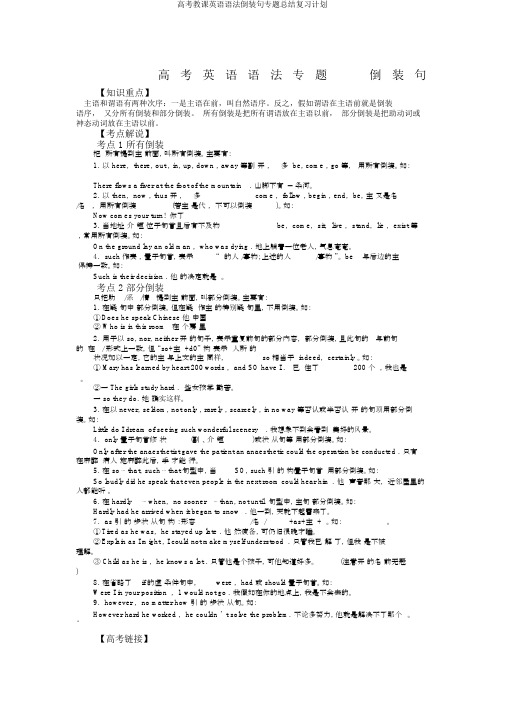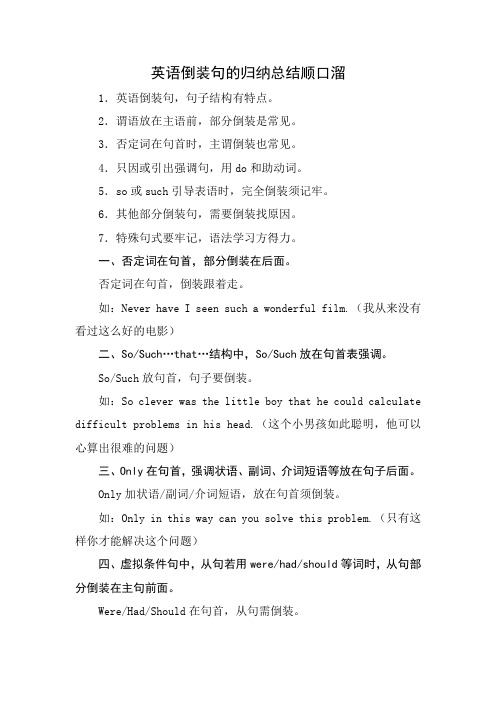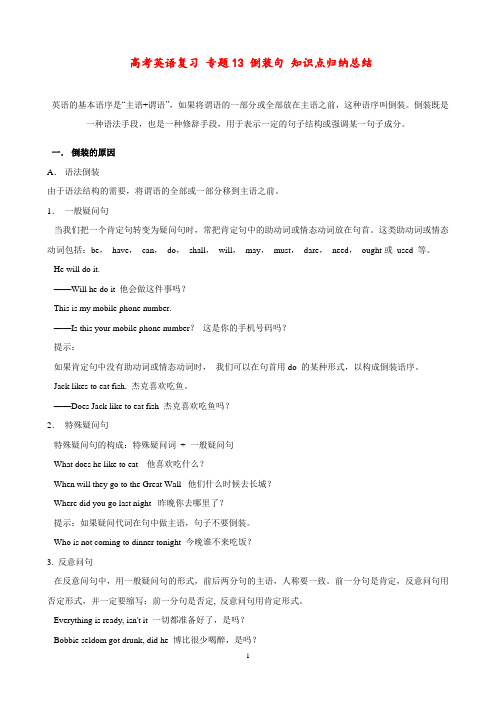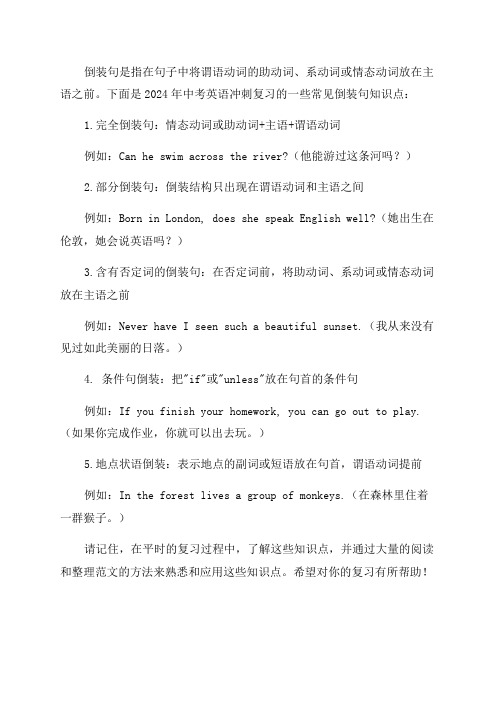英语倒装句详解复习进程
语法专题复习倒装句部分倒装完全倒装和语序颠倒

语法专题复习倒装句(部分倒装、完全倒装和语序颠倒)一.知识梳理:1.完全倒装:1)There be 结构2)某些表时间、方位、地点的副词或介词短语放在句首3)作表语的形容词、过去分词、现在分词放在句首2.部分倒装:1)Only+状语2)表否定的副词、介词短语或连词放在句首3)……也如此类(So/Neither/Nor)位于句首4)Such/So……that 如此……以致……5)虚拟类(Were/Should/Had)放在句首6)祝愿类May sb do3.语序颠倒:1)表语/状语/动词原形+as/though+主语+谓语2)感叹句(How/What)3)(whatever/no matter what等)让步状语从句+主语+谓语4)The +比较级+主语+谓语,the +比较级+主语+谓语二.观察并记忆:1.There stands an old temple on the top of the mountain.山顶上耸立着一座古庙。
2.Here comes a bus.车子来了。
3.The bell rang . In came our headmaster.铃响了。
我们校长进来了。
4.On the wall hang two photos.墙上挂着两张照片。
5.Present at the meeting were the teachers and the headmaster.出席会议的有老师和校长。
6.Gone are the days when they had to work hard day and night.日夜辛苦劳作的日子一去不复返。
7.Only when he knew the truth did he realize he was cheated.只有当他知道真相时他才意识到被骗。
8.If you don’t go there tomorrow , neither will I.如果你明天不去,我也不去。
高中英语 高三复习倒装句资料 含讲义和练习、答案

倒装句:“NAOSHI” 原则一、什么是倒装:有时由于句子结构的需要或表示强调或方便上下文衔接,要采用倒装形式。
主+ 谓------------- 自然语序谓+ 主------------- 完全倒装助动词/系动词/情态动词+ 主+ 谓------------- 部分倒装(半倒装)强调部分+ as + 主+ 谓------------- 形式倒装举例:1. The bus is coming here!倒装:Here comes the bus! (名词作主语)2. Our school lies north of the river.倒装:North of the river lies our school.二、“闹事N A O S H I”原则详解:N: 助动词/系动词/情态动词+ 主语+ 谓语(半倒装)1. 否定副词置于句首,句子部分倒装,( 如never, nor, not, hardly, hardly...when, no sooner...than, little, seldom, scarcely, rarely等)Hardly do I think you will make it.Not until midnight did it stop raining.Not only should we not be afraid of difficulties, but we should try our best to overcome them.2. 表示否定意义的短语置于句首,部分倒装,( 如at no time, under/in no circumstances, in no case, by no means,on no condition 等)By no means should you tell him about it. 你绝不要告诉他这事。
A : 形式倒装(前置)As/though引导的让步状语从句:只把强调的内容提到句首,主谓不用变化。
倒装句的用法规则口诀

倒装句的用法规则口诀一、倒装句的用法规则倒装句是英语语法中常见的一种结构,它与正常语序不同,其主谓之间的位置发生了颠倒。
在英语中,倒装句的使用相对灵活多样,但也有一些固定的规则和口诀可以辅助学习和记忆。
下面我将为大家介绍倒装句的用法规则及相关口诀。
1.完全倒装在以下情况下,需要进行完全倒装:- 在表示地点或方向的副词位于句首时- Up the hill walked the old man.(老人沿着山走上去了。
)- Out of the room rushed the cat.(猫从房间里冲出来了。
)- 在以否定词开头的副词置于句首时- Never have I seen such a beautiful sunset.(我从未见过如此美丽的日落。
)- Not only is he intelligent, but he also has a great sense of humor.(他不仅聪明而且还很幽默。
)2.半倒装半倒装指的是部分动词前移,而主语依然位于动词之后。
- 当以“only+状语”开头时- Only by working hard can you achieve success.(只有通过努力你才能取得成功。
)- 当以“so+形容词/副词+be/do/have+主语”结构开头时- So beautiful is the view that it takes my breath away.(美景如此令人惊叹,不禁让我屏住了呼吸。
)- 在以否定词“never”或“nor”开头的句子中- Never have I been so excited.(我从未这么兴奋过。
)- Nor did he notice the warning sign.(他也没有注意到警示牌。
)3.助动词倒装在一些特殊的情况下,助动词需要与主语发生位置上的倒装。
- 在表示强调的句子中- It is Mary who won the competition.(是玛丽赢得了比赛。
高考教学英语语法倒装句专题总结复习计划

高考英语语法专题倒装句【知识重点】主语和谓语有两种次序:一是主语在前,叫自然语序。
反之,假如谓语在主语前就是倒装语序,又分所有倒装和部分倒装。
所有倒装是把所有谓语放在主语以前,部分倒装是把助动词或神态动词放在主语以前。
【考点解说】考点 1 所有倒装把所有提到主前面,叫所有倒装。
主要有:1.以 here, there,out ,in,up,down ,away 等副开,多 be,come ,go 等,用所有倒装。
如:There flows a fiver at the foot of the mountain.山脚下有—条河。
2.以 then, now ,thus 开,多come , follow ,begin ,end, be,主又是名/名,用所有倒装(若主是代,不可以倒装)。
如:Now comes your turn! 你了3.当地址介短位于句首且后有不及物be, come, sit, live , stand, lie , exist 等,常用所有倒装。
如:On the ground lay an old man , who was dying .地上躺着一位老人,气息奄奄。
4. such 作表,置于句首,表示“ 的人/事物;上述的人/事物”。
be 与后边的主保持一致。
如:Such is their decision .他的决定就是。
考点 2 部分倒装只把助 /系 /情提到主前面,叫部分倒装。
主要有:1.在疑句中部分倒装。
但在疑作主的特别疑句里,不用倒装。
如:①Does he speak Chinese 他中国② Who is in this room 在个房里2.用于以 so,nor,neither 开的句子,表示重复前句的部分内容,部分倒装,且此句的与前句的在 / 形式上一致,但“so+主 +d0” 构表示人所的状况加以一定,它的主与上文的主同样,so 相当于 indeed, certainly 。
英语倒装句的归纳总结顺口溜

英语倒装句的归纳总结顺口溜1.英语倒装句,句子结构有特点。
2.谓语放在主语前,部分倒装是常见。
3.否定词在句首时,主谓倒装也常见。
4.只因或引出强调句,用do和助动词。
5.so或such引导表语时,完全倒装须记牢。
6.其他部分倒装句,需要倒装找原因。
7.特殊句式要牢记,语法学习方得力。
一、否定词在句首,部分倒装在后面。
否定词在句首,倒装跟着走。
如:Never have I seen such a wonderful film.(我从来没有看过这么好的电影)二、So/Such…that…结构中,So/Such放在句首表强调。
So/Such放句首,句子要倒装。
如:So clever was the little boy that he could calculate difficult problems in his head.(这个小男孩如此聪明,他可以心算出很难的问题)三、Only在句首,强调状语、副词、介词短语等放在句子后面。
Only加状语/副词/介词短语,放在句首须倒装。
如:Only in this way can you solve this problem.(只有这样你才能解决这个问题)四、虚拟条件句中,从句若用were/had/should等词时,从句部分倒装在主句前面。
Were/Had/Should在句首,从句需倒装。
如:Should it rain tomorrow,we wouldn't be able to go on the hiking trip.(如果明天下雨的话,我们就不可能去徒步旅行了)五、让步状语从句中,as/though引导的从句表强调放在句首时需要倒装。
as/though表强调,引导从句须倒装。
如:Though he is a child,he knows a lot of knowledge.(虽然他还是个孩子,但他知道很多知识)。
高考英语复习 专题13 倒装句 知识点归纳总结

高考英语复习专题13 倒装句知识点归纳总结英语的基本语序是“主语+谓语”,如果将谓语的一部分或全部放在主语之前,这种语序叫倒装。
倒装既是一种语法手段,也是一种修辞手段,用于表示一定的句子结构或强调某一句子成分。
一.倒装的原因A.语法倒装由于语法结构的需要,将谓语的全部或一部分移到主语之前。
1.一般疑问句当我们把一个肯定句转变为疑问句时,常把肯定句中的助动词或情态动词放在句首。
这类助动词或情态动词包括:be,have,can,do,shall,will,may,must,dare,need,ought或used 等。
He will do it.——Will he do it 他会做这件事吗?This is my mobile phone number.——Is this your mobile phone number?这是你的手机号码吗?提示:如果肯定句中没有助动词或情态动词时,我们可以在句首用do 的某种形式,以构成倒装语序。
Jack likes to eat fish. 杰克喜欢吃鱼。
——Does Jack like to eat fish 杰克喜欢吃鱼吗?2.特殊疑问句特殊疑问句的构成:特殊疑问词+ 一般疑问句What does he like to eat 他喜欢吃什么?When will they go to the Great Wall 他们什么时候去长城?Where did you go last night 昨晚你去哪里了?提示:如果疑问代词在句中做主语,句子不要倒装。
Who is not coming to dinner tonight 今晚谁不来吃饭?3. 反意问句在反意问句中,用一般疑问句的形式,前后两分句的主语,人称要一致。
前一分句是肯定,反意问句用否定形式,并一定要缩写;前一分句是否定, 反意问句用肯定形式。
Everything is ready, isn't it 一切都准备好了,是吗?Bobbie seldom got drunk, did he 博比很少喝醉,是吗?You had a wonderful time last night, didn't you 昨天晚上你玩得很愉快,是吗?4.感叹句英语中的感叹句有时也通过倒装的形式来表达。
2024年中考英语冲刺复习知识点倒装句

倒装句是指在句子中将谓语动词的助动词、系动词或情态动词放在主语之前。
下面是2024年中考英语冲刺复习的一些常见倒装句知识点:
1.完全倒装句:情态动词或助动词+主语+谓语动词
例如:Can he swim across the river?(他能游过这条河吗?)
2.部分倒装句:倒装结构只出现在谓语动词和主语之间
例如:Born in London, does she speak English well?(她出生在伦敦,她会说英语吗?)
3.含有否定词的倒装句:在否定词前,将助动词、系动词或情态动词放在主语之前
例如:Never have I seen such a beautiful sunset.(我从来没有见过如此美丽的日落。
)
4. 条件句倒装:把"if"或"unless"放在句首的条件句
例如:If you finish your homework, you can go out to play.(如果你完成作业,你就可以出去玩。
)
5.地点状语倒装:表示地点的副词或短语放在句首,谓语动词提前
例如:In the forest lives a group of monkeys.(在森林里住着一群猴子。
)
请记住,在平时的复习过程中,了解这些知识点,并通过大量的阅读和整理范文的方法来熟悉和应用这些知识点。
希望对你的复习有所帮助!。
2023届中职高考英语复习倒装句复习

B. he can repair the computer
C. can the computer beputer can be repaired
剖 析
考查倒装句(部分倒装)。句意为:“只有这样,电脑 才能修好。”“Only+副词/介词短语/状语从句”放在句首, 句子需用部分倒装,排除B、D两项;the computer与 repair之间是动宾关系,应用被动语态。故选C。
谓语动词通常是be,come,go,run,rush,fly, follow,fall等不及物动词。此处的here,there不是表示地点, 而是用来引起对方的注意。例如:
Here comes the bus. 公交车来了。 There goes the bell. 铃响了。 Out rushed the boys.男孩子们冲了出来。 【注意】全部倒装结构中的主语必须是名词。如果主语是 人称代词,主谓则不能倒装。 Here he comes. 他来了。 Out they rushed. 他们冲了出来。
A. we think
B. think we
C. we do think
D. do we think
解析:考查倒装句。句意为:“我们因笑话而笑,但很少去思考笑话是怎样让我们笑的。
”seldom为否定副词,放句首,句子用部分倒装。故选D。
- 1、下载文档前请自行甄别文档内容的完整性,平台不提供额外的编辑、内容补充、找答案等附加服务。
- 2、"仅部分预览"的文档,不可在线预览部分如存在完整性等问题,可反馈申请退款(可完整预览的文档不适用该条件!)。
- 3、如文档侵犯您的权益,请联系客服反馈,我们会尽快为您处理(人工客服工作时间:9:00-18:30)。
英语倒装句详解倒装句详解概念:用以表示一定句子结构的需要和强调某一句子成分的需要, 分为完全倒装和部分倒装.一.完全倒装:句子中的谓语动词全部置于主语之前.此结构通常只用与一般现在时和一般过去时.1.以here, there, now, then等副词或 out, in, up, down, away等表示运动方向的副词或地点状语置于句首以示强调, 句子要全部倒装, 谓语动词常用come,go, be, lie,run,rush等.2. 表示地点的介词短语位于句首时A beautiful lake lies at the foot of the hillAt the foot of the hill lies a beautiful lake.注意:在上述句子中, 如果主语为人称代词, 则主、谓不需要倒装.In he came and back he went again.Away he went .二.部分倒装:be/助动词/情态动词提前到主语的前面.Is am are was were(be动词)do does did(助动词) can could would may will might(情态动词)等1.only所修饰的副词、介词短语或状语从句放在句首时, 要进行部分倒装.Only then did I realize the importance of learning English.Only after he came back was I able to see him.注:only修饰主语, 仍用自然语序, 如:Only socialism can save China.I seldom go to the cinema.倒装:Seldom do I go to the cinema.我很少去看电影.I have never seen such a performance.倒装:Never have I seen such a performance.我从来没有看过这样的表演.2.否定副词及介词短语的否定词位于句首时.高考常考的这类词或词语有:never , not, seldom, hardly, little, nowhere, by no means, in no time等 .3.not until 引导的从句位于句首引起的主句部分倒装He didn’t finish his homework until his mother came back.倒装:Not until his mother came back did he finish his homework.直到他的妈妈回来, 他才完成作业.The mother didn’t leave the room until the child fell asleep.倒装:Not until the child fell asleep did the mother leave the room.等到孩子睡着了, 妈妈才离开房间.注意:当Not until引出主从复合句, 主句倒装, 从句不倒装.4、as/ though (虽然, 尽管)引导的让步状语从句名词\形容词\副词\分词+as\though+主语+其他Although I am ugly, I am gentle.倒装:Ugly as I am, I am gentle.Though he is a child, he has to make a living.倒装:Child as he is, he has to make a living.注意:从句的表语是名词, 其名词前不加任何冠词5.用于so nor neither 开头的句子A、So +be/助动词/情态动词+主语某人也是如此Nor/neither +be/助动词/情态动词+主语某人也不是如此1). 他喜欢读书, 我也是.He likes reading very much. So do I .2). 我从来没有去过广州大学, 他也是.I have never been to Guangzhou University, neither/ nor has he.Betty is a nice girl. So she isB、So +主语+be/助动词/情态动词某人确实如此6.在hardly/scarcely/…when;no sooner…than; not only … but also;so...that; such…that 的倒装句中, 前倒后不倒.hardly/scarcely/ no sooner后句子的谓语用had done, when/than后句子的谓语用一般过去时(1) Hardly / Scarcely had he fallen asleep when a loud knock at the door awaked him.(2) No sooner had I reached the station than train moved.(3) Not only is he interested in football but also he plays it well.(4) So hard does he work that he has made great progress in English.7. If 虚拟条件从句中.从句有(were/should/had)1)If I were you, I would work hard. 倒装:Were I you, I would work hard.2) If it should rain tomorrow, we would put off our meeting.倒装: Should it rain tomorrow, we would put off our meeting.3)If he had followed my advice, he would have succeeded.倒装:Had he followed my advice, he would have succeeded.8.May置句首, 表示祝愿.May you succeed.祝你成功!补充知识1.全部倒装全部倒装是只将句子中的谓语动词全部置于主语之前.此结构通常只用于一般现在时和一般过去时.常见的结构有:1)here, there, now, then, thus等副词置于句首, 谓语动词常用be, come, go, lie, run等表示来去或状态的动词.Then came the chairman. 那时总裁来了.Here is your letter. 你的信.2)表示运动方向的副词或地点状语置于句首, 谓语表示运动的动词.Out rushed a missile from under the bomber. 轰炸机肚底下窜出一枚导弹.Ahead sat an old woman. 前面坐着一个老妪.注意:上述全部倒装的句型结构的主语必须是名词, 如果主语是人称代词则不能完全倒装.Here he comes. 他来了.Away they went. 他们走开了.2.部分倒装部分倒装是指将谓语的一部分如助动词或情态倒装至主语之前.如果句子的谓语没有助动词或情态动词, 则需添加助动词do, does或did, 并将其置于主语之前.1.句首为否定或半否定的词语, 如no, not, never, seldom, little, hardly, at no time决不, in no way, not until… 等.Never have I seen such a performance. 从未见过如此糟糕的表演.Nowhere will you find the answer to this question. 无论如何你不会找到这个问题的答案的.Not until the child fell asleep did the mother leave the room. 母亲一直到孩子入睡后离开房间.2.当Not until引出主从复合句, 主句倒装, 从句不倒装.注意:如否定词不在句首不倒装.I have never seen such a performance. ---never have I seen such a performance.The mother didn\'t leave the room until the child fell asleep.---not until the child fell asleep the mother did leave the room.改写为正常语序为, Man did not know what heat is until the early years of the 19th. 现在将not提前, 后面就不能再用否定了,否则意思就变了.3.以否定词开头作部分倒装如Not only…but also, Hardly/Scarcely…when, No sooner… than等, 要倒装.Not only did he refuse the gift, he also severely criticized the sender. 他没有收下礼物, 还狠狠批评了送礼的人.Hardly had she gone out when a student came to visit her. 她刚出门, 就有个学生来访.No sooner had she gone out than a student came to visit her. 她刚出门, 就有个学生来访.4. so, neither, nor作部分倒装用这些词表示\"也\"、\"也不\" 的句子要部分倒装.Tom can speak French. So can Jack. 汤姆会讲法语, 杰克也会.If you won\'t go, neither will I.你不去, 我也不去.注意:当so引出的句子用以对上文内容加以证实或肯定时, 不可用倒装结构.意为\"的确如此\". Tom asked me to go to play football and so I did. 汤姆邀我去踢球, 我去了.---It\'s raining hard.---So it is. 雨下得真大.是呀.5. only在句首倒装的情况.Only in this way, can you learn English well. 只有这样, 你才能学好英语.Only after being asked three times did he come to the meeting. 叫了三次, 他才来参加会议.如果句子为主从复合句, 则主句倒装, 从句不倒装.Only when he is seriously ill does he ever stay in bed. 病得狠重时, 他才卧床休息.6. as, though 引导的倒装句as / though引导的让步从句必须将表语或状语提前(形容词, 副词, 分词, 实义动词提前).但需注意:1)句首名词不能带任何冠词.2)句首是实义动词, 其他助动词放在主语后.如果实义动词有宾语和状语, 随实义动词一起放在主语之前.Try hard as he will, he never seems able to do the work satisfactorily. 他工作很努力, 但总不能让人满意. 注意:让步状语从句中, 有though, although时, 后面的主句不能有but, 但是 though 和yet可连用. 7. 其他部分倒装1)so… that 句型中的so 位于句首时, 需倒装.So frightened was he that he did not dare to move an inch. 他害怕得很, 动也不敢动.2)在某些表示祝愿的句型中.例如:May you all be happy. 愿你们都快乐.3)在虚拟语气条件句中从句谓语动词有were, had, should等词, 可将if 省略, 把 were, had, should 移到主语之前, 采取部分倒装.例如:Were I you, I would try it again. 我是你的话, 就再试一次.深化拓展一、全倒装:五全=有时表地方经常与be/come/exist/fall/follow/go/remain/seem/stand(表示移动或动态的不及物动词连用)或用表示类似存在观念的其他不及物动词如:live, stand, come, lie, flow, enter, rise 和appear等1、有:在there be结构里There is a box on the table.桌子上面有一个盒子.2、时:表示时间副词, 如:now, then,Now comes your turn.现在轮到你了.3、表:表语放句子前,表语+系动词+主语的结构Present at the party were Mr. Green and many other guests.格林先生和其他的客人在这个聚会上.Seated on the ground are a group of young men.一群年轻人坐在了地上.4、地:地点状语放在句首In south of the river lies a small factory. 小工厂位于河的南方.From the valley came a cry.山谷传来一阵哭声.5、方:表方位的副词here, there 或out, in, up, down, away, off等标志词放在句首There lies a large wheat field in front of the house.房子前面有一大片麦田.Off all the lights went when I came in.当我进来时, 所有的灯都灭了.二、半倒装:八部=不只让步也常需(虚)如此祝福1、不表示否定①no, not, never, hardly, no,not,never,hardly,barely,seldom,rarely,scarcely,no longer,nowhere Never have I been to Beijing.我从没有没有去过北京.②绝不:at n time, in no way, by no means, on no account, in no case, in/under no circumstanceAt no time can we give up.我们决不能放弃.③Not until ...:直到Not until my mother came home did I go to bed.知道我妈妈回家我才睡觉.④Hardly/ Scarcely...(过完)...when...(一过)...:一...就...No sooner...(过完)...than...(一过)...:一...就...He had hardly got home when it happened to rain.=Had he hardly got home when it happened to rain.他一到家碰巧就下雨了.⑤Not only......but also......:(前倒后不倒)Not only did he refuse the gift, he also severely criticized the sender.他没有收下礼物, 还狠狠批评了送礼的人2、只:only所修饰的副词、介词短语或状语从句放在句子开头时.Only then did I realize that I was wrong.只有到那时我才意识到我错了.Only in this way can you learn from your mistake.只有用这样的方法你可以从错误中学习.Only when the war was over in 1918 was he able to get happily back to work.只有当战争于1918年结束时候, 他才能够快乐地回到工作当中.※当only 之后所接的不是状语时不可以用倒装Only Comrade Zhang knows about the matter..只有张同志知道这件事.3、让步:as/though/although引导让步状语从句时要倒装(形/副/名/动+as +主语 + 谓语)Proud as they are, they are afraid to see me.尽管他们自豪, 但是他们还怕见到我.Child as he is, he seems to know everything.(child前不加冠词)尽管他是个孩子, 但他好像知道一切.Hard as he worded, he made little progress.尽管他努力工作, 但是几乎没什么进步.※以上句中as可以替换though/although, 但是as更加常用.4、也:so/nor/neither开头,表示谓语所述的情况也适用于另一个人或一事物的肯定或否定句so用于肯定句, 表示也一样也这样;nor/neither用于否定句, 表示同样也不, 也不这样.I am watching TV. So is she.我正在看电视, 她也在看.My parents didn't watch TV last night. Neither (Nor) did I.我父母昨晚没有看电视, 我也没有看.※表示两人的同样一个情况时, 只能表示一件事, 即上、下句所使用的动词、时态要一致. 5、常:表示频度副词如:often、many a time, now and again等经常用于正式的文体中Often did he advise them not to smoke.他经常建议他们不要抽烟.6、需=虚拟:省略if的虚拟条件句, 把助动词were、had、should提到主语前面时Had it not been for your help, we shouldn't have achieved so much.要不是你的帮助, 我们不可能收获这么多.7、如此:so/such …that….从句中, 当so+形容词/副词或such+名词位于句首时.So exhausted was she that she wanted to have a rest.他是如此地疲惫以至于想要休息一下.8、祝福:当may放在句首, 表达祝愿时. May you succeed! 祝你成功!。
